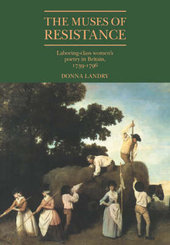
|
The Muses of Resistance: Laboring-Class Women's Poetry in Britain, 1739-1796
Paperback / softback
Main Details
| Title |
The Muses of Resistance: Laboring-Class Women's Poetry in Britain, 1739-1796
|
| Authors and Contributors |
By (author) Donna Landry
|
| Physical Properties |
| Format:Paperback / softback | | Pages:336 | | Dimensions(mm): Height 246,Width 172 |
|
| Category/Genre | Poetry by individual poets
Literary studies - c 1500 to c 1800
Literary studies - poetry and poets |
|---|
| ISBN/Barcode |
9780521021951
|
| Classifications | Dewey:821.5099287 821.5099287 821.5099287 |
|---|
| Audience | | Professional & Vocational | | General | | Tertiary Education (US: College) | |
|---|
| Illustrations |
Worked examples or Exercises
|
|
Publishing Details |
| Publisher |
Cambridge University Press
|
| Imprint |
Cambridge University Press
|
| Publication Date |
3 November 2005 |
| Publication Country |
United Kingdom
|
Description
In this challenging 1990 study, Donna Landry shows how an understanding of the remarkable but neglected careers of laboring-class women poets in the eighteenth century provokes a reassessment of our ideas concerning the literature of the period. Poets such as the washerwoman Mary Collier, the milkwoman Ann Yearsley, the domestic servants Mary Leapor and Elizabeth Hands, the dairywoman Janet Little, and the slave Phyllis Wheatley can be seen adapting the conventions of polite verse for the purposes of social criticism. Some of their strategies relate to earlier texts, revealing ideological blind spots in the tropes of male poets. Elsewhere, they made interesting innovations in poetic form. Mary Leapor's 'Crumble Hall', for instance, by attending to sexual politics, extends the critique of aristocratic privilege in the country-house poem beyond that of Pope and Crabbe. In Ann Yearsley's verse, landscape description, historical narrative, and philosophical meditation are infused with political comment. Historically important, technically impressive and often aesthetically innovative, the poetic achievements of these plebeian women writers constitute an exciting literary discovery.
Reviews"For anyone interested in women's poetry, in class politics and art, or in eighteenth-century literature, this book is a real find." The Women's Review of Books
|